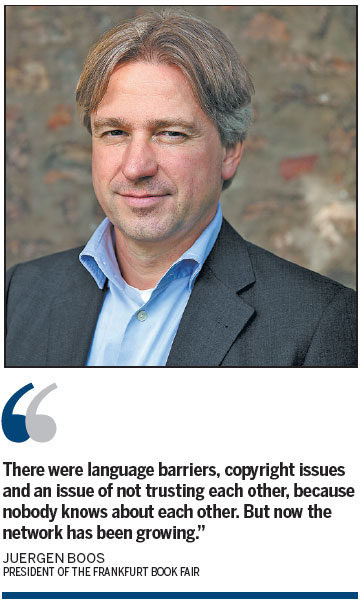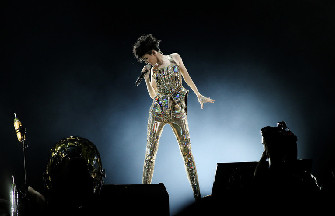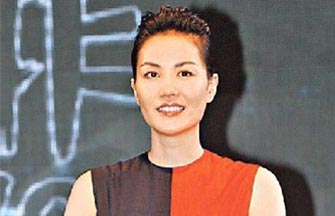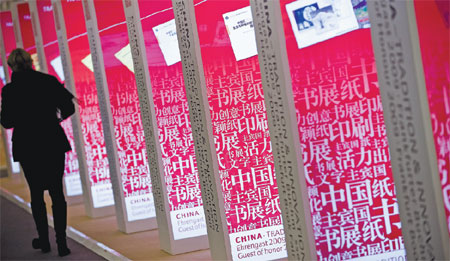Twisting tongues
Updated: 2014-07-09 07:26
By Chen Yingqun (China Daily)
|
||||||||
The Frankfurt Book Fair has big plans for China and the rest of Asia as publishers work to break down language, cultural and business barriers. Chen Yingqun reports.
In an age when machines do translations almost instantly, it may seem that publishing books in multiple languages around the world could be done at the snap of a finger. While the works of prominent authors easily jump linguistic and national boundaries - like those of 2012 Nobel literature laureate Mo Yan - that's not necessarily so in other cases. Many authors and publishers who aspire to sell their books internationally face hard-to-solve cultural differences and a lack of qualified human translators.
Publishers in China and other countries are eager to communicate more and develop good working relationships, but they still have a long way to go, says Juergen Boos, president of the Frankfurt Book Fair.
Boos was in Beijing recently attending StoryDrive Asia, a gathering dedicated to exploring new forms of collaboration and business models across media boundaries. The Frankfurt Book Fair is a lead organizer.
Chinese publishers in the past few years have been more willing to talk to their overseas counterparts about difficult topics, a big change since it was difficult to even think about working together before, according to Boos.

"There were language barriers, copyright issues and an issue of not trusting each other because nobody knows about each other. But now the network has been growing."
Boos says that at the book fair people were very surprised about how much information they received from Chinese publishers. "Years ago it was very difficult. Probably it was the same the other way around."
Boos says Asia's publishing industries are drawing more international attention. Representatives from China, South Korea and Indonesia, for example, are busy at book exhibitions, and the number of Asian attendees has increased.
This year, organizers upgraded the annual StoryDrive China event, which was first held in 2012, and made it StoryDrive Asia, because they expected more exchanges across the region.
"We want to establish a platform in Beijing similar to the Frankfurt Book Fair. For example, if publishers from South Korea are interested in trading copyrights here, they don't need to go to Frankfurt but could just do it at the new platform here," Boos says.
He adds that they will also develop similar meeting opportunities in key countries as well as in prominent cities, such as Shanghai.
Boos says the potential is great for cross-border deals. There are several kinds of books in China that would be popular in the West, he says, such as ones about China's history and traditional culture.
Also, because of China's tremendous changes, books about the country's social transformation and modern politics and economics would also draw a lot of attention. Travel books, children's books and cookbooks also are a lot easier to publish internationally.
But for all that to happen, he says, more communication is essential.
"There's still a long way to go for Chinese publishers, I think. It is still not very common to travel a lot. And to do international business, you have to build up your own network and you have to build up trust, and this will take a lot of time. It is not enough to go once a year somewhere outside China."
Boos says that in Germany about 80 percent of imported works are from English-speaking countries. Few are from China.
Mo Yan's books have been translated, mainly because he is a Nobel prizewinning author, he says. "The situation only improves when things like this happen."
Challenges include the market, because publishers focused on profits go for safe belts. Because of Europe's cultural similarities, for example, a book successful in Germany will be easier to publish in France as well. But it may be very difficult to publish the same book in China.
Translation can be another problem, he says. Translation of literature requires higher skills than for more basic or academic texts. There is a lack of talented translators who have mastered both Chinese and German.
Boos says he saw more serious intentions to work together among Chinese and German publishers during his visit. Plans were not limited to the trade in copyrights like before, he says. There was also a good amount of discussion about their own markets.
"When we discussed, what everybody was interested in was applied arts, such as economics and technology," Boos says.
"It is very easy for these books to travel across cultures because many people are interested in the development of design in China.
"So it is about getting to know each other and getting to know the needs of the market."
At next year's Frankfurt Book Fair, Asian publishers will be moved from a marginal area to a more central location, Boos says, and participating countries will be grouped together. In the past, pavilions for different Asian countries have been a half-hour walk apart.
Grouping geographical areas is expected to promote synergy, he says.
Contact the writer at chenyingqun@chinadaily.com.cn
|
Chinese publishers have stronger presence at international book events. China was the guest of honor at the Frankfurt Book Fair in 2009. Provided to China Daily |
(China Daily 07/09/2014 page22)

 Star Stefanie Sun holds concert in Beijing
Star Stefanie Sun holds concert in Beijing
 Faye Wong's manager refutes star's drug rumors
Faye Wong's manager refutes star's drug rumors
 Lu Yi and daughter Bei Er pose for street snaps
Lu Yi and daughter Bei Er pose for street snaps
 Photoshoots of actress Li Xiaomeng
Photoshoots of actress Li Xiaomeng
 Council of Fashion Designers of America Awards
Council of Fashion Designers of America Awards
 Fan Bingbing, first Chinese actress in Barbie Hall of Fame
Fan Bingbing, first Chinese actress in Barbie Hall of Fame
 Awarding ceremony of 2014 hito Pop Music held in Taipei
Awarding ceremony of 2014 hito Pop Music held in Taipei
 Zhao Liying's photo shoot for Children's Day
Zhao Liying's photo shoot for Children's Day
Most Viewed
Editor's Picks

|

|

|

|

|

|
Today's Top News
Ex-security chief Zhou Yongkang under probe
Prudence urged over solar dispute
US visa delays likely to continue
McDonald's fishing for supplier
OSI group to fund food safety
China's FDI in US set for increase
Glitch delays visas for US-bound students
A musical spoof of the Clinton years
US Weekly

|

|







